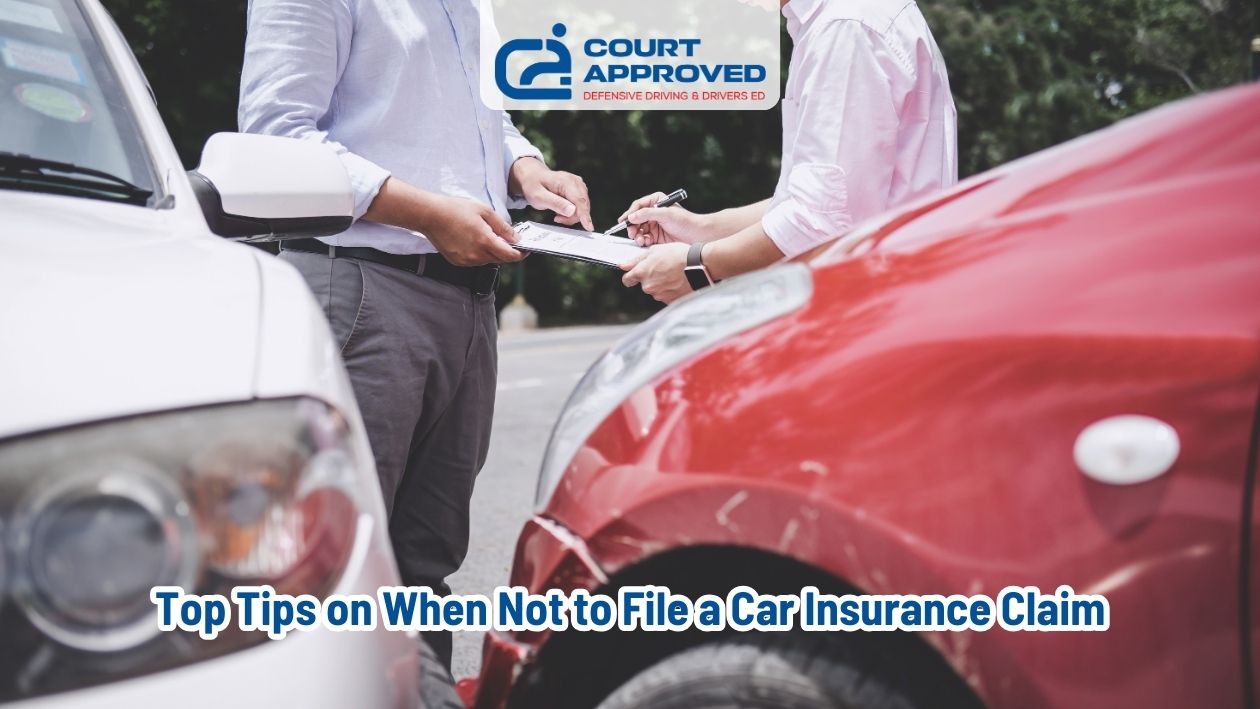When not to file a car insurance claim? If repairing minor dents and scratches or handling low-impact single-car accidents, paying out of pocket can be a better option. In this blog, we’ll explore why and when you should avoid filing a claim to save on costs.
Key Takeaways
- Filing claims for minor vehicle damage often leads to higher premiums; repair costs under the deductible are better handled out of pocket.
- Single-car accidents with minimal damage should be settled privately if costs are low, avoiding insurance involvement to keep rates from increasing.
- High-risk drivers must evaluate the impact of multiple claims on premium rates; minor damages may be more sensibly paid out of pocket to maintain lower insurance costs.
Minor Vehicle Damage
Driving inevitably comes with the risk of accidents, and even minor incidents can result in some level of vehicle damage. When facing such small damages, it’s often wiser financially to pay for the repairs yourself instead of submitting a car insurance claim. Opting to file a claim for trivial dents or scratches may seem sensible at first. This could lead to higher car insurance premiums over time and might ultimately cost you more than handling the expenses directly.
Damages like slight dents on bumpers or minimal scratches typically don’t exceed deductible levels, rendering an insurance claim superfluous. It is essential to carefully consider whether the repair costs warrant risking potential hikes in your car insurance rate before deciding if filing a claim is worthwhile.
In subsequent sections, we’ll explore how dealing with small dents and scratches out-of-pocket can be financially advantageous when these are below your deductible threshold, bypassing unnecessary claims that could influence overall repair costs under traditional insurance coverage parameters.
Small Dents and Scratches
Minor blemishes like small dents and scratches on your car, while irritating, typically don’t impede the performance of the vehicle. They merely mar its exterior. The expense of fixing these slight defects is often below the deductible for car insurance. It might be financially wiser to manage these repairs directly rather than going through your insurance.
For those driving older cars where aesthetics are not a chief concern, opting out of filing an insurance claim for such cosmetic damage is even more logical. You should consider heading straight to an auto body shop and paying for the services yourself. This decision could prevent an unwelcome rise in your car insurance rates that often accompany claims submission.
Repair Costs Under Deductible
When the costs of repair fall below your deductible, it is not economically prudent to file an insurance claim. The financial gains from making a claim are typically outweighed when the cost for repairs does not exceed your deductible amount. Under such circumstances, it’s Advisable to cover the repair expenses on your own and steer clear of engaging in the insurance claims process.
Should the repair costs exceed your deductible by only a slight margin, reflect upon how this could potentially impact future premiums. Securing a repair estimate before initiating a claim can assist you in assessing whether proceeding with filing would be financially beneficial or detrimental over time. This approach aims to safeguard against unnecessary increases in your insurance rates while helping you conserve funds long-term.
Single-Car Accidents with Minimal Impact
In instances of single-car accidents where the impact is slight, it might be unnecessary to file an insurance claim. If the minor damage repair costs are less than your deductible, it could be wiser to handle these expenses on your own. By doing so, you avoid possible hikes in your premium and maintain a spotless insurance history.
Should the damage from a solo car accident amount to less than $1,000, taking responsibility for covering those repairs personally may prove advantageous. We will delve into specifics concerning collisions at low speeds and mishaps occurring within parking lots as we progress.
Low-Speed Collisions
When you experience a low-speed collision, like gently hitting a pole or tapping another vehicle, the resulting damage is usually minor and cosmetic. If the costs to fix your vehicle are below your deductible for collision coverage, or if you don’t have this type of insurance at all, it might be more economical to pay for these repairs yourself rather than reaching out to your insurer.
Paying for such minor repair expenses on your own can help avoid increases in future premiums and maintain an unblemished insurance history. Because low-speed impacts often only cause minor damage, handling the expense directly is typically a prudent decision.
Parking Lot Incidents
Incidents in parking lots often lead to minor property damage, which can usually be addressed without the need to engage with your insurance company. These small accidents happen at reduced speeds and only cause minimal harm, like slight dents or scrapes. Initiating an insurance claim for such incidents might result in unwarranted hikes in your premiums.
Managing these repairs yourself and paying for them directly is a strategy that could help you save money while steering clear of the complexities tied to navigating the insurance claims process.
Situations Where Premium Increases Outweigh Benefits

It may not be wise to file a claim for slight damage, as it could lead to an increase in premium costs. When the cost of the damage is equal to or lower than the deductible, it’s usually more financially prudent to cover the expense yourself rather than filing a claim that could have lasting financial effects. Carefully considering all expenses involved, including possible rises in premiums, is essential before deciding whether to proceed with filing a claim.
Experiencing an accident where you’re at fault can cause your insurance rates to surge by around 50%. With this significant potential rate hike in mind, one must carefully evaluate if the payout from making a claim justifies facing higher insurance costs moving forward. Discussions. One will delve into issues faced by high-risk drivers and those with histories of submitting multiple claims.
High-Risk Drivers
Drivers considered high-risk will encounter increased insurance premiums, even for claims tied to minor occurrences such as a car crash where another driver is at fault. Injuries like whiplash can occur from low-speed collisions, in spite of the cars sustaining little apparent damage. It’s crucial for these drivers to evaluate the extended financial consequences of submitting claims for small-scale incidents that happen within a brief timeframe.
It is imperative that high-risk motorists carefully balance the prospective hike in their premiums against the advantages they might receive from a claim’s payout before proceeding with filing one. This deliberate evaluation aids them in making sound decisions regarding their finances.
Multiple Claims History
Filing for car insurance claims, especially multiple ones within a short period, can drastically increase your insurance rates. In some cases, it could even lead to your premiums doubling if you report too many claims.
By paying for minor damages yourself instead of filing an insurance claim, you can keep your car insurance rates down and avoid putting extra financial pressure on yourself. This approach is beneficial in managing costs associated with car insurance and maintaining affordable premiums.
When Liability Coverage Doesn’t Apply
Liability insurance covers damage and injuries caused to others, as well as legal defense costs. However, it does not cover damage to your own vehicle; for that, you need collision coverage. If you lack collision coverage and are at fault, you are responsible for paying out-of-pocket for damages to your own vehicle.
Knowing when liability coverage doesn’t apply helps make informed decisions about filing a claim. The following subsections will explore non-covered events and policy limits.
Non-Covered Events
Typically, standard liability coverage does not include scenarios such as floods or mechanical breakdowns resulting from natural disasters. To be protected against these types of damages, one needs collision coverage or other specialized policies.
It is important to have a clear understanding of what your policy entails to prevent filing claims that won’t be honored and to ensure you are equipped for any potential incident. Make sure you consistently check your policy so that you fully understand which accidents and incidents it does not cover.
Policy Limits
It’s crucial to grasp the concept of policy limits within your car insurance to prevent unforeseen expenses. Surpassing these limits in a claim can result in substantial costs that must be covered out-of-pocket, which is an approach that lacks practicality.
By sticking to the established policy and time limits set by your insurance, you safeguard yourself against extra expenditures, ensuring you’re financially ready should any claims arise. Proper management of these limits is essential for maintaining financial stability in the event of an accident.
Settling Minor Accidents Privately

Resolving small-scale accidents without involving insurance can bypass the complexities and expenses associated with filing insurance claims. Often, drivers opt for this method as it allows them to avoid hikes in their premiums while dealing with incidents more quickly.
On the flip side, there are hazards such as the chance that other parties may retract their agreement or unforeseen damages might emerge afterward. The subsequent segments will delve into consensual arrangements between drivers and examine the potential pitfalls of privately arranged settlements when they involve other parties.
Mutual Agreement with Other Drivers
Reaching a mutual agreement with the other driver simplifies the aftermath of a minor accident. This approach lets both parties avoid the hassle and cost of insurance claims. For a successful private settlement, both parties should communicate clearly and document the agreement to minimize disputes.
However, there are potential risks, including the possibility of the other party backing out or discovering hidden damages later. Clear communication and documentation are key to a successful private settlement.
Risks of Private Settlements
Resolving a minor accident between the involved parties without resorting to insurance claims can help dodge related expenses. Yet, there are inherent dangers, such as the other party retracting their agreement or discovering damages later on that weren’t initially obvious.
Should the other party withdraw from your arrangement, you might find yourself responsible for damages previously settled upon. Unforeseen damage costs that arise after settling could make it vital to weigh these potential risks carefully before deciding on a private resolution of an accident.
Older Vehicles with Low Value
When dealing with older vehicles that have depreciated in value, it may not be prudent to file a claim if the repair costs are close to or surpass what the vehicle is worth on the market. This is because, as vehicles age, their market values decrease, which can make any repair expenses appear relatively steep.
In cases where an older vehicle’s repair cost exceeds its current market value, paying for repairs oneself might be a more advantageous approach to manage losses. Subsequent subsections will delve into issues related to cosmetic damage and considerations of total loss, emphasizing the relevance of repair costs.
Cosmetic Damage
For vehicles with diminished value, typically older ones, it may not be justified to file claims for cosmetic damages. These types of damage include scratches, dents, or paint chips that do not impact the functionality of the vehicle.
It is important to assess if the repair costs justify filing a claim when dealing with low-value vehicles. Minor cosmetic damage could result in higher premiums if a claim is made, which might not be economically wise.
Total Loss Consideration
Incurring repair costs on older vehicles for minor damages could result in the car being declared a total loss, implying that it is financially prudent to refrain from filing claims. This declaration happens when the cost of repairs exceeds the current value of the vehicle.
Choosing not to file a claim for small-scale repairs might be more economically sensible since it can prevent an increase in insurance premiums or additional expenses paid directly by you. Managing these lesser repairs independently is typically advisable to bypass potential total loss declarations associated with older cars.
Steps to Take Before Deciding Not to File a Claim

Before you opt out of filing a claim, it’s essential to carefully assess whether this is the most advantageous choice given your circumstances. It might be wise not to pursue a claim for situations like minor vehicle damage, an accident involving only your older car with limited value, or when no other vehicles are involved. By being cautious in these scenarios, you can prevent avoidable hikes in your insurance premiums and make choices that benefit your financial health.
It’s imperative to collect all relevant information from the scene of the car accident, including details from any other driver(s) involved and photos capturing the extent of harm done to each vehicle. Having this evidence on hand can prove critical if you later decide that filing a claim is necessary or when discussing what happened with your insurance agent, particularly as they help gauge potential impacts on future policy costs.
Subsequent sections will delve into comprehensive strategies for appraising vehicular damage accurately, obtaining estimates for repairs required, and seeking guidance from your insurance provider before moving forward with a claim.
Assess Damage Thoroughly
Evaluating both the serious and significant damage meticulously is essential, as it serves as the initial and most vital part of determining if you should file an insurance claim. Investigate not just apparent damages but also any potential concealed harm that might not be obvious right after an accident. Start by examining all evident damage to your vehicle, aiming for a complete grasp of its extent.
Making a well-informed choice on whether to initiate an insurance claim hinges on conducting a thorough inspection for both noticeable and unseen damages. Such careful scrutiny aids in assessing the merit of filing a claim and discerning what would constitute the best course within the framework of both the general insurance claim process and your specific situation regarding filing said claim.
Get Repair Estimates
It is essential to acquire estimates for repairs to accurately evaluate the extent of damage done to a vehicle and aid in deciding whether or not it’s prudent to file a claim. Understanding the full scope of repair costs can assist you in sidestepping unwarranted claims, which could otherwise result in increased insurance premiums.
Procuring quotes from trustworthy body shops specializing in auto repair empowers you with the knowledge needed to make an informed choice regarding your potential claim.
Summary
Knowing when not to file a car insurance claim is just as important as knowing when to file one. Filing claims for minor damages or incidents can sometimes lead to higher premiums, making it counterproductive in the long run. By assessing the costs and benefits of filing a claim, you can make smarter choices that safeguard both your vehicle and your financial well-being.
At Court Approved Defensive Driving, we’re committed to helping drivers make informed decisions and stay safer on the road. Through a defensive driving course in Dallas, TX, you can improve your understanding of safe driving practices and learn how to avoid situations that might lead to an accident or claim. Take charge of your driving safety today and build confidence behind the wheel with us!
Frequently Asked Questions
Why would someone not file an insurance claim?
People might opt out of submitting an insurance claim for minor damages when the cost to repair is at most equal to their deductible, thus averting unnecessary extra expenses from their own pocket.
Handling small-scale repairs on one’s own, stemming from a minor accident, could be a wiser choice to prevent possible hikes in insurance premiums.
When is it better to handle minor vehicle damage out of pocket instead of filing a claim?
If the repair costs for minor vehicle damage fall below your insurance deductible, it may be more cost-effective to pay these expenses on your own. Doing so can help you avoid possible hikes in your insurance premiums.
What should you do before deciding not to file a claim?
Before deciding not to file a claim, it is essential to thoroughly assess the damage, obtain repair estimates, and consult with your insurance agent to make an informed decision.
This approach ensures that you consider all factors before making your choice.
Why might it not be worthwhile to file a claim for older vehicles with low value?
It is often not worthwhile to file a claim for older vehicles because repair costs can exceed the vehicle’s market value, making it more practical to pay for repairs out of pocket.


